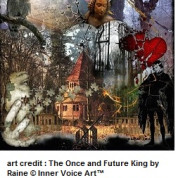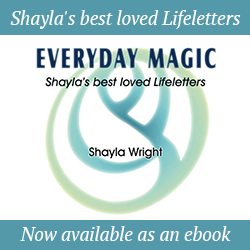
There’s a beautiful documentary, called ‘How Wolves Change Rivers,’ about what happened when a group of wolves was brought back to live in Yellowstone Park: https://www.youtube.com/watch?v=ysa5OBhXz-Q
The wolves had such a massive effect on the whole environment of the park that in a surprisingly short time, even the river changed its course. Those wolves weren’t walking around saying to each other, “Wow, we’re so powerful, look what we did–we changed the river!” They were simply an intimate part of everything in that park–that’s how the change happened. The wolves started eating the deer, so the deer stopped eating the trees by the river. After a while the trees by the river grew back, and their roots changed the whole structure of the banks of the river, holding the soil there. Then birds and animals came back to live in the trees by the river, and they changed the whole ecosystem.
Those wolves had no intention to transform their whole environment. Everything happened by itself. Even the people who brought the wolves back into the park had no idea that the wolves would change the river.
The wild geese do not intend to cast their reflection;
The water has no mind to receive their image.
~ Zenrin Kushu
Isn’t it strange, that interconnection is simply the way things are, and yet we persist, so vigorously, to uphold our sense of being separate, distinct and alone? We are really just like those wolves, totally embedded in this vast, pulsating web of life. My little separate ‘I’ is not really making things happen. And still I think I am in control of my life, until something intervenes to destroy that hallucination. It’s not so easy to open myself up to this bigger picture—even when all of the evidence is right in my face. It’s a lot like facing the fact that I’m going to die. If I don’t want to know, then I’ll simply find a way to ignore the glaring truth of it.
A woman in New York City a few years ago had a hairdryer whose cord was falling apart. A friend had warned her not to use it because it could blow the fuse in her power panel. One day she had wet hair and wanted to go out, so she decided to use it anyway. The exact moment that she turned it on, the whole city had that massive power blackout that lasted for days. She was so convinced she had caused it, that she eventually went down to the police station and turned herself in. “I did it, “ she told them. “I caused the blackout.” They laughed at her a lot. I imagine she felt pretty foolish.
Has something like this ever happened to you? It certainly has to me. And it was quite embarrassing. Our egoic mind functions like this a great deal of the time. It makes me so important—I really think I am the centre of everything. And that I am totally separate and distinct from everything else. What we are waking up to these days, in our global culture, is that life is not like this at all. We are so connected to each other that it’s mind boggling, overwhelming. And when everything is connected to everything else, how can one tiny thing be the cause of something else? It’s like that wonderful remark of Carl Sagan’s: “If you wish to make an apple pie from scratch, you must first invent the universe.”
Life is wild, complex and mysterious. Whenever I hold on to a fixed point of view, life will come along and wash it away, by and by. I can get stuck in thinking I am just this separate self who does things, who makes things happen. This is a very narrow and limited perspective, and it will bring me a lot of suffering. But I can get stuck in the opposite point of view too, like a lot of spiritual people. I can start believing that the perspective of the ‘I’ is wrong, selfish, and that I should try not to use it. We run into all sorts of problems with this point of view.
If i start to think of the ‘I’ as a bad thing, I turn against myself in ways that can be very unkind and destructive. Everything has its place in this vast complex universe we inhabit. There are times when the voice of the ‘I’ is essential. One of these times is when I need to make amends, to take responsibility for my actions. It’s simply amazing how healing it can be when I am able to say to say to another human being, “I did that, and it caused harm. I am very sorry. Please forgive me.” No excuses, no stories about what my mother did to me when I was young. Just the plain and simple facts of my actions and their consequences.
Speaking in this voice, the clear voice of my separate self, can create profound openings. It’s the basis of the reconciliation work that is happening in the prisons. It’s amazing what we can forgive, what the heart can make room for, when someone is brave enough to stand in front of us and say, “I did that. And here are the consequences, from which I cannot escape. I am so sorry for the suffering I have caused you.” People have been able to forgive the murderers of their children and their parents, when the person who did it made amends in this way.
What a paradox! We’d like to get things straightened out, so life is lucid and simple, not so messy and complex. But the more we wake up, the bigger the paradoxes get. Just as it’s hard to face how little control we actually have over our lives-we really want to believe that we are in charge. And at the same time, we keep trying to wiggle out of facing what we actually are responsible for. It can be very hard to say “I did it.” Facing ourselves in this way can bring up intense feeling of shame. If the shame is healthy, it will carry us into an experience of healing remorse. We’ll know what to do to take action, to make amends. And we’ll do it.
This is our practice, whenever we are ready to embrace it: we can practice facing into how little control we actually have, just feeling what happens when we open to the wild unmanageable nature of life, without flinching. And we can practice taking responsibility, saying “I did this and I’m sorry” for small things. That way, we might be ready when we really need to say a bigger “I’m sorry.”
Adya Shanti, a well known spiritual teacher, says it like this: “Enlightenment relieves you of the illusion of control. But it doesn’t mean you’ll never have to say I’m sorry.”
with love,
Shayla
art credit : The Once and Future King by Raine © Inner Voice Art™
www.facebook.com/pages/Inner-


Stay Connected